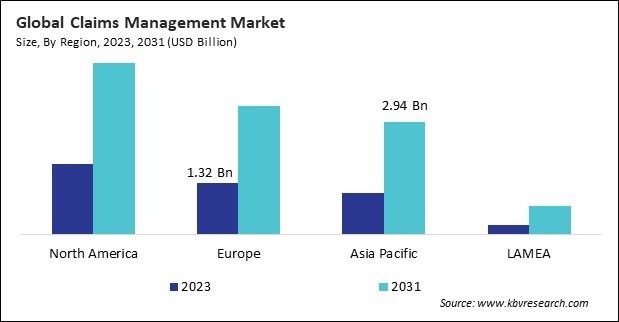According to a new report, published by KBV research, The Global Claims Management Market size is expected to reach $11.48 billion by 2031, rising at a market growth of 13.1% CAGR during the forecast period.
The Small & Medium Enterprises (SMEs) segment is exhibiting a CAGR of 14.4% during (2024 - 2031). SMEs are increasingly contributing to the claims management market, propelled by the availability of cost-effective, scalable solutions tailored to their needs. Cloud-based platforms and subscription-based pricing models have made advanced claims management systems accessible to smaller businesses, allowing them to streamline processes without substantial upfront investment. The need to improve operational efficiency, reduce manual errors, and enhance customer satisfaction motivates SMEs to adopt these technologies.

The Cloud segment is leading the Global Claims Management Market by Deployment Mode in 2023; thereby, achieving a market value of $7.4 million by 2031. Cloud-based solutions remove the necessity for substantial initial investments in infrastructure, rendering them particularly appealing to organizations of all sizes, especially small and medium enterprises (SMEs). These platforms enable remote access, which became critical during the COVID-19 pandemic and the rise of remote work. Additionally, integrating advanced technologies like artificial intelligence (AI) and machine learning (ML) further enhances operational efficiency and accuracy, driving the adoption of cloud solutions. Cloud service providers' lower maintenance burden and automatic updates contribute to its widespread appeal.
The Healthcare Providers segment is registering a CAGR of 12.9% during (2024 - 2031). The adoption of claims management systems helps healthcare providers navigate challenges such as billing errors, regulatory compliance, and reimbursement delays. Advanced solutions, including AI-driven platforms, enable providers to automate claims submissions, verify insurance coverage, and process payments more efficiently. For instance, hospitals and clinics use integrated claims management systems to ensure compliance with regulations like HIPAA, reduce denials, and enhance cash flow. The growing focus on operational efficiency and patient satisfaction has further fueled the adoption of these solutions among healthcare providers.
The Internet of Things (IoT) segment is generating the maximum revenue in the Global Claims Management Market by Technology in 2023; thereby, achieving a market value of $4.8 billion by 2031. Its ability to enhance real-time data collection and processing drives the segment's growth. IoT-enabled devices, such as telematics in the automotive industry and wearable health monitors in the healthcare sector, provide precise and timely data that streamline claims verification and assessment processes. This technology significantly reduces fraud, accelerates claims processing, and improves accuracy. For instance, insurers use IoT data from smart sensors to assess property damage after natural disasters, ensuring faster and more transparent settlements. These capabilities have made IoT an indispensable technology in claims management, particularly for large-scale insurers.
The Health Insurance Claims segment shows a CAGR of 12.6% during (2024 - 2031). The surge in medical claims, especially during and after the COVID-19 pandemic, highlighted the importance of efficient claims management systems. Healthcare payers and insurers are adopting automated solutions to handle high claim volumes, reduce reimbursement delays, and ensure regulatory compliance. The integration of AI and analytics tools in health insurance claims management further enables precise claims validation and fraud detection, ensuring smoother operations and improved customer experiences.
Full Report: https://www.kbvresearch.com/claims-management-market/
The North America region dominated the Global Claims Management Market by Region in 2023, and would continue to be a dominant market till 2031; thereby, achieving a market value of $4.4 billion by 2031. The Europe region is experiencing a CAGR of 12.9% during (2024 - 2031). Additionally, The Asia Pacific region would exhibit a CAGR of 14.1% during (2024 - 2031).
By Enterprise Type
By Deployment Mode
By Technology
By End-user
By Type
 Unique Offerings
Unique Offerings